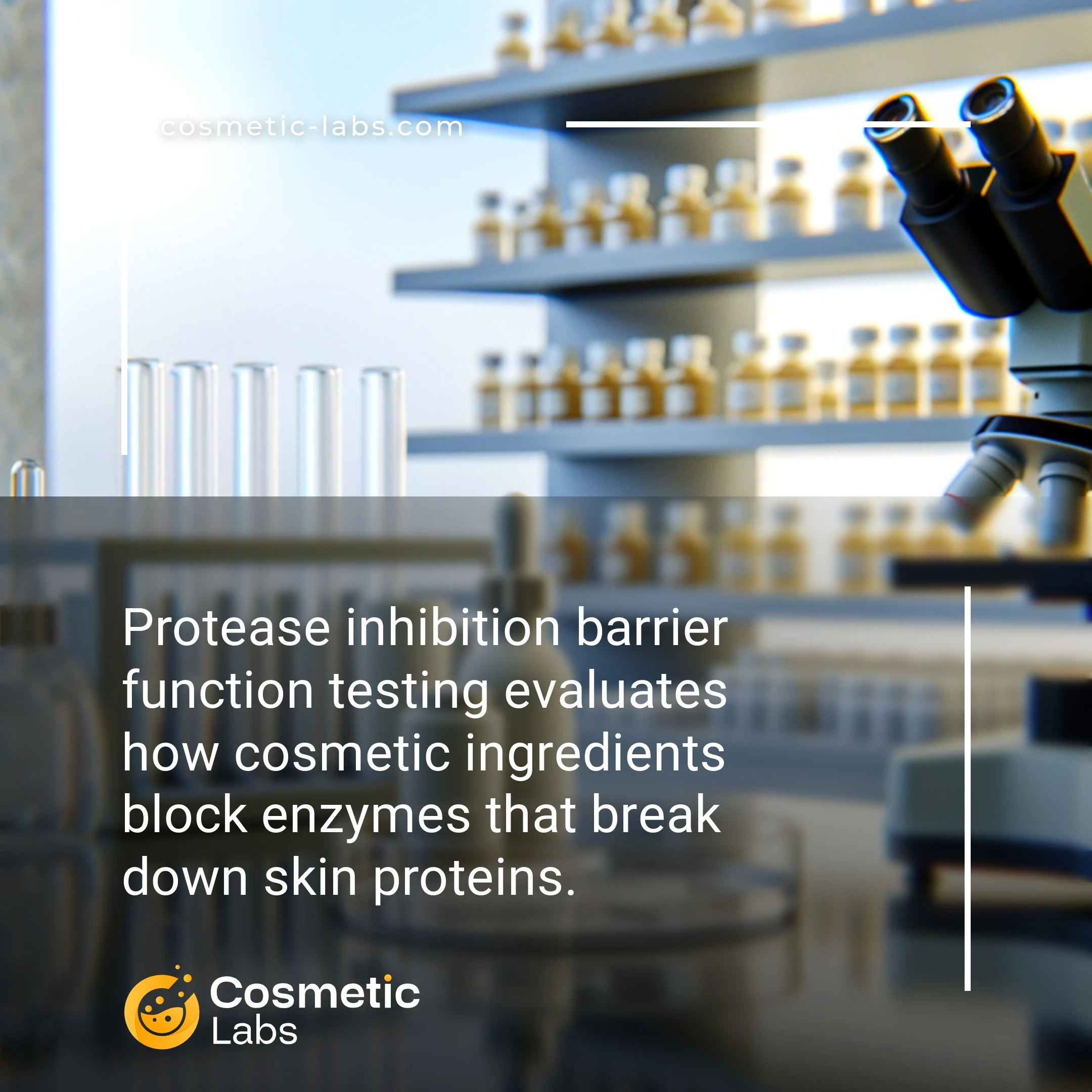Protease Inhibition Testing for Skin Barrier Function

What is Proteases inhibition?
Protease inhibition for barrier function testing evaluates how cosmetic ingredients protect skin proteins from enzymatic breakdown that weakens the barrier. Labs use controlled protease exposure on skin models to measure ingredient efficacy in preventing collagen and elastin degradation. This testing reveals whether your formulation can maintain skin integrity under stress conditions, providing data that supports anti-aging and barrier repair claims for regulatory submissions.
Why do you need this service?
Cosmetic labs utilize protease inhibition assays to validate anti-aging formulations by measuring how ingredients prevent enzymatic breakdown of skin proteins like collagen and elastin. These tests help brands demonstrate product efficacy claims for wrinkle reduction and skin firmness, providing quantifiable data that supports marketing messages and regulatory submissions for mature skin care products.
Who provides Proteases inhibition services?
All cosmetic labs providing Proteases inhibition services
There is no company providing these services at the moment.
Protease Inhibition Testing for Skin Barrier Function Assessment
Protease inhibition testing measures how effectively cosmetic formulations prevent enzyme-mediated breakdown of skin proteins. This specialized assay evaluates your product’s ability to protect the skin barrier by blocking proteolytic enzymes that degrade structural proteins like filaggrin and involucrin.
Enzyme Activity Measurement Protocols
Labs use standardized protease substrates to quantify inhibition rates across multiple enzyme classes. The testing process involves exposing target proteases to your formulation at various concentrations, then measuring residual enzymatic activity.
Key protease targets include:
- Kallikrein-related peptidases (KLK5, KLK7, KLK14)
- Cathepsin enzymes
- Matrix metalloproteinases (MMPs)
- Trypsin-like serine proteases
Results provide IC50 values and dose-response curves that demonstrate your product’s barrier protection efficacy at different concentrations.
Application in Product Development
This testing helps validate claims for anti-aging, sensitive skin, and barrier repair products. Labs typically run these assays during formulation optimization to identify the most effective ingredient combinations and concentrations.
The data supports regulatory submissions and marketing claims by providing concrete evidence of protease inhibition activity. You’ll receive detailed reports showing inhibition percentages, statistical significance, and comparative analysis against reference compounds.
Connect with specialized cosmetic labs on our platform to discuss protease inhibition testing requirements for your specific formulation needs.
Applications of Protease Inhibition Testing for Skin Barrier Function
Protease inhibition testing for barrier function provides measurable data on how cosmetic formulations protect skin from enzymatic breakdown that compromises barrier integrity.
Anti-Aging Product Development
Labs use protease inhibition assays to evaluate how serums and creams protect against matrix metalloproteinases (MMPs) and elastase activity. These enzymes break down collagen and elastin, leading to visible aging signs. Testing protocols measure inhibition percentages at 24, 48, and 72-hour intervals using standardized enzyme panels.
Results show which peptides, botanical extracts, or synthetic compounds deliver the strongest protective effects against enzymatic degradation. Brands receive IC50 values and dose-response curves to optimize active ingredient concentrations for maximum barrier protection.
Sensitive Skin Formulation Validation
Protease inhibition testing validates formulations designed for compromised skin barriers. Labs measure how products inhibit trypsin, chymotrypsin, and kallikrein enzymes that trigger inflammation and barrier disruption. Testing includes both immediate inhibition and sustained protection over 8-12 hours.
Data helps brands document barrier-strengthening claims with specific enzyme inhibition percentages. This testing supports regulatory submissions and provides scientific backing for sensitive skin product positioning in competitive markets.
| Enzyme Target | Barrier Impact | Testing Duration | Key Metrics |
|---|---|---|---|
| Matrix Metalloproteinases | Collagen breakdown | 24-72 hours | IC50, % inhibition |
| Elastase | Elastin degradation | 48 hours | Dose-response curves |
| Kallikrein | Inflammation cascade | 8-12 hours | Sustained protection |
| Trypsin/Chymotrypsin | Barrier disruption | Immediate + 8 hours | Inhibition kinetics |
Ready to validate your barrier protection claims with protease inhibition testing? Contact specialized cosmetic labs on our platform to discuss your specific formulation needs and testing protocols.
